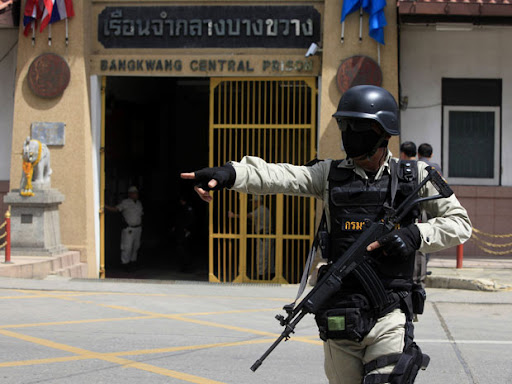The infamous Bangkok nightlife is no national or international secret. From the strip joints of Patpong to Soi Cowboy with their bars and nightclubs, the Phetchaburi and Ratchadaphisek roads with their massage parlours and spas that offer "special services", the numerous pubs, bars, executive clubs and "marn rood" (curtained) hotels - all are proof of a thriving sex industry in the capital.
From "a-go-gos" to "coyotes" and the odd and varied sex shows, girls, boys and increasingly transvestites dance the floors half or fully naked. Alcohol flows and sex workers can be had for a fee. As for the spas and massage parlours, the rooms are conveniently included with the services rendered.
In Bangkok and other cities like Pattaya, Phuket and Chiang Mai, you can of course enjoy sightseeing the various historical, cultural, sea and sand tourist destinations. But at the same time, the sex trade flourishes, attracting all sorts of personalities - not only tourists looking for fun but also criminals, sex offenders, paedophiles and many other dodgy characters. Human and drug trafficking are intertwined. Crime, robbery and murder become widespread and corruption rampant.
It is not just corruption in the sense that officials take bribes and allow wrongdoing to take place. The acceptance that nothing can be done about the sex trade in Thailand, that this is part of a "normal" way of life, corrupts the minds of the people and bleaches into the ethical fabric of a society.
The three teenagers, aged 13, 14 and 16, should not be blamed for society's misconduct; why should they become the national scapegoat for their misconduct, even though news reports said they admitted to having intentionally danced topless?
They had been drinking with friends before leaving home and, for them, to dance in such a manner was nothing strange since they had been to "an entertainment place that has naked shows in exchange for the price of admission and drinks; where if one went bottomless, they could win a complimentary bottle of whiskey"!
If our youth are thinking along these lines then we definitely have more problems to deal with than just fining the three girls. The police and government authorities, by clamping down on the girls and the enthusiasts who posted the video clips on the Internet, demonstrate the Thai hypocrisy and denial. By trying to quickly close the case and getting the news off the front page, the authorities are not addressing the real problem at all.
If corruption is a root cause, hypocrisy and denial are what make matters worse. If one cannot look the truth in the eye and carries on pretending that darkness does not exist, then no problem will be resolved.
Many may argue that Thailand and its red-light districts are a normal way of life and that the tourism industry, with sex as its main attraction, makes a lot of money for the country.
As I said, I am a realist; I am not going to pretend that all such establishments, right down to the last whorehouse, will be eliminated and Thailand will become the peaceful and ethical Buddhist society depicted in a lot of temple paintings.
Nor am I a saint, since as a man growing up in Thailand I've had my share of escapades to those places I have described.
But if New York City can clean up Times Square, and if Boston's aggressive policy can lead to the demise of Combat Zone, then why can't Bangkok?
If CNN can launch its Freedom Project to end modern slavery, including human trafficking, and if Piers Morgan can invite Hollywood actor Ashton Kutcher on his show to say "Real men don't buy girls!", why does Thailand have to accept its place in the world as the premier sex city trading in modern slavery?
How can we all live with a clear conscience when our sons and daughters are being bought and sold, where many can attain better opportunities with education and proper healthcare? Can you really sleep at night if teenagers are willing to dance naked just for a bottle of whiskey?
Is the money we gain from tourism to sexual destinations really worth the loss of our human dignity and that of the next generation's?






 12:48
12:48
 Reporter
Reporter

 Posted in:
Posted in: 

